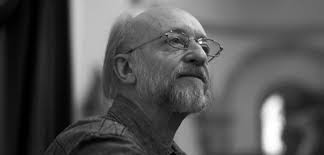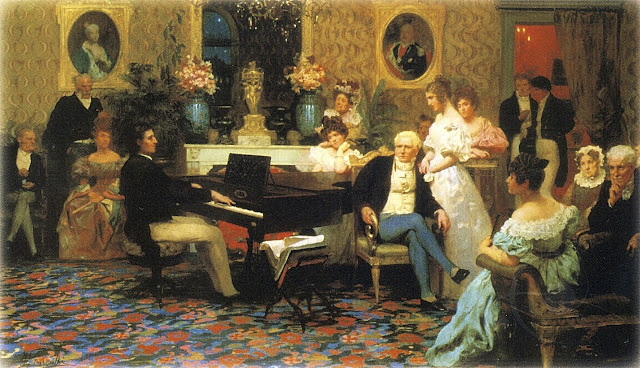The Russian pianist, fortepianist and harpsichordist Alexei Lubimov has a distinguished reputation as a former pupil of Henryk Neuhaus at the Moscow Conservatory. As with many musicians who are fascinated by the music of the Baroque performed on early instruments, he also harbours a passion for contemporary music of the twentieth century.
I also share these twin passions for as well as playing the harpsichord and period piano, in my twenties I was writing my own experimental avant garde texts
in the style of the Nouveau Roman and was deeply interested in
contemporary classical music. In 1968 as an observer I attended some of
the classes given by the German electronic composer Karlheinz
Stockhausen at the Rheinische Musikschule in Cologne (Courses for
New Music) together with the Australian composer
David Ahern. Also of course I studied Messiaen, Xenakis, Boulez, Pousseur, Berio, Kagel, Cage...Lubimov was highly praised for his exciting performances of works by contemporary composers. In 1968, he gave the Moscow premieres of works by John Cage and Terry Riley and brought to Russian audiences for the first time Schönberg, Webern, Stockhausen, Boulez, Ives, Ligeti and many contemporary composers born in the former USSR, such as Schnittke, Gubaidulina, Silvestrov and Pärt.
I have a soft spot for his recording for Harmonia Mundi of Schubert Impromptus Op. 90 D 899 and Op.142 D 935 on pianos by Matthias Müller (1810) and Joseph Schantz (1828) that has the appropriate sensitive poetic 'watercolour timbre and tonality' I personally associate with Schubert's psyche rather than the dynamic inflations customary on a modern Steinway.
However tonight it was the Mozart Concerto for two pianos in E - flat major KV 365 with the Polish pianist Hubert Rutkowski. The Polish, German and American music press described Rutkowski's playing thus:
'A sensitive poet of sound'
'...the pianist's way of playing may be regarded as closer to the old performance traditions of Friedman or Paderewski rather than leaning towards contemporary, very often too disciplined and unerringly standardized, concepts of performing...'
'...the artist captivates with the way he accurately reads the lyricism comprised in music and reaches for virtuoso skills only when needed'.
Of particular interest to to me, Hubert Rutkowski is a founder and President of the Theodor Leschetizky Music Society in Warsaw. Also in the Chopin Year 2010, he recorded a fascinating CD entitled 'Pupils of Chopin' - piano works by Carl Filtsch, Thomas D. A. Tellefsen, Karol Mikuli and Adolph Gutmann (NAXOS).
The concert opened with the Overture to the Mozart opera La Clemenza di Tito. In August 1791, Mozart received a commission to compose an opera celebrating the coronation of Emperor Leopold II as King of Bohemia at Prague. The coronation was to take place in early September which was formidably short notice for such a work. Under enormous pressure Mozart completed it in just eighteen days, even finishing sections in the carriage on the way to the Prague premiere. A very modern situation!
I felt there could have been a far more drama, classical 'Roman' nobility and excitement in this performance as a preamble to the opera itself as well lighter more elegant phrasing and sprung rhythmic gestures with the rather 'conversational' instrumental writing which I tend to associate with Mozart.
The orchestral part the Concerto for Two Pianos KV 365 could also have had more internal life, elegant lightness and gracefulness, even wit as it is widely accepted that Mozart intended to play this concerto with his sister Maria Anna known in the family as 'Nannerl'. The orchestra is a type of background to the predominant dialogue between the two pianos.
I found the use of two Pleyel instruments, one a modern Paul McNulty copy and the other an original instrument, deeply instructive. The contrasting colours, tone quality and timbre were similar in some respects yet completely different in others which highlighted the different voices, Mozart's painting of them in sound and their delightful 'conversation'. The modern copy lighter and sweeter than the more rounded quality of the more mature original instrument. If the work had been performed on two concert Steinways this charming and refined contrast would have been completely erased in an homogeneous wash of sound. Both pianists were impeccable in their knowledge of the classical style, the panache and elan of Mozart keyboard works in bringing the interpretation to life.
After the interval one of my favourite Mozart symphonies, the 'Linz' KV 425 named after the town in which he wrote it in 1783 whilst journeying back to Vienna from Salzburg. Written in four days! The overall aim of their excursion was to reconcile father and son and the rest of the family. Leopold was under some emotional pressure to accept the relatively recent marriage of his son to Constanze. Nannerl simply found Constanze 'unsuited to her brother'.
The happy couple spent a few days in Linz having accepted the invitation of a family friend, Count Thun-Hohenstein.
'When we reached the gates of the city,' Wolfgang wrote to this father on October 31, 'we found a servant waiting there to drive us to Count Thun’s, at whose house we are now staying. I really cannot tell you what kindnesses the family is showering on us. On Tuesday, November 4, there will be an academy [concert] in the theatre here and, as I have not a single symphony with me, I am writing a new one at breakneck speed.'
I am afraid I found this account lacking in the fantastic tension and drama Mozart writes with in this symphony, particularly in the first extensive Allegro spiritoso movement. Dark clouds were partially present in the Adagio, the Minuet and Trio could have had a slightly more sprightly and witty air and the finale certainly more passionate and dazzling in its fierce tensions and relaxations.
All in all however a most instructive concert which merely confirmed in my mind the judicious use of period keyboard instruments in modern performances, with 'judicious' being the operative word.





Comments
Post a Comment